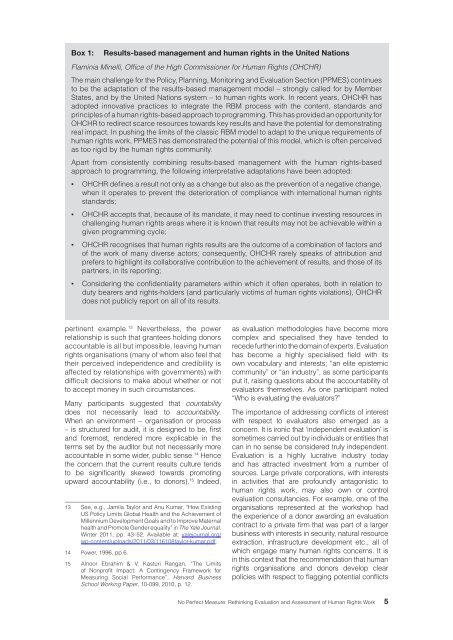No Perfect Measure: Rethinking Evaluation and ... - The ICHRP
No Perfect Measure: Rethinking Evaluation and ... - The ICHRP
No Perfect Measure: Rethinking Evaluation and ... - The ICHRP
You also want an ePaper? Increase the reach of your titles
YUMPU automatically turns print PDFs into web optimized ePapers that Google loves.
Box 1:<br />
Results-based management <strong>and</strong> human rights in the United Nations<br />
Flaminia Minelli, Office of the High Commissioner for Human Rights (OHCHR)<br />
<strong>The</strong> main challenge for the Policy, Planning, Monitoring <strong>and</strong> <strong>Evaluation</strong> Section (PPMES) continues<br />
to be the adaptation of the results-based management model – strongly called for by Member<br />
States, <strong>and</strong> by the United Nations system – to human rights work. In recent years, OHCHR has<br />
adopted innovative practices to integrate the RBM process with the content, st<strong>and</strong>ards <strong>and</strong><br />
principles of a human rights-based approach to programming. This has provided an opportunity for<br />
OHCHR to redirect scarce resources towards key results <strong>and</strong> have the potential for demonstrating<br />
real impact. In pushing the limits of the classic RBM model to adapt to the unique requirements of<br />
human rights work, PPMES has demonstrated the potential of this model, which is often perceived<br />
as too rigid by the human rights community.<br />
Apart from consistently combining results-based management with the human rights-based<br />
approach to programming, the following interpretative adaptations have been adopted:<br />
▪ ▪ OHCHR defines a result not only as a change but also as the prevention of a negative change,<br />
when it operates to prevent the deterioration of compliance with international human rights<br />
st<strong>and</strong>ards;<br />
▪ ▪ OHCHR accepts that, because of its m<strong>and</strong>ate, it may need to continue investing resources in<br />
challenging human rights areas where it is known that results may not be achievable within a<br />
given programming cycle;<br />
▪ ▪ OHCHR recognises that human rights results are the outcome of a combination of factors <strong>and</strong><br />
of the work of many diverse actors; consequently, OHCHR rarely speaks of attribution <strong>and</strong><br />
prefers to highlight its collaborative contribution to the achievement of results, <strong>and</strong> those of its<br />
partners, in its reporting;<br />
▪ ▪ Considering the confidentiality parameters within which it often operates, both in relation to<br />
duty bearers <strong>and</strong> rights-holders (<strong>and</strong> particularly victims of human rights violations), OHCHR<br />
does not publicly report on all of its results.<br />
pertinent example. 13 Nevertheless, the power<br />
relationship is such that grantees holding donors<br />
accountable is all but impossible, leaving human<br />
rights organisations (many of whom also feel that<br />
their perceived independence <strong>and</strong> credibility is<br />
affected by relationships with governments) with<br />
difficult decisions to make about whether or not<br />
to accept money in such circumstances.<br />
Many participants suggested that countability<br />
does not necessarily lead to accountability.<br />
When an environment – organisation or process<br />
– is structured for audit, it is designed to be, first<br />
<strong>and</strong> foremost, rendered more explicable in the<br />
terms set by the auditor but not necessarily more<br />
accountable in some wider, public sense. 14 Hence<br />
the concern that the current results culture tends<br />
to be significantly skewed towards promoting<br />
upward accountability (i.e., to donors). 15 Indeed,<br />
13 See, e.g., Jamila Taylor <strong>and</strong> Anu Kumar, “How Existing<br />
US Policy Limits Global Health <strong>and</strong> the Achievement of<br />
Millennium Development Goals <strong>and</strong> to Improve Maternal<br />
health <strong>and</strong> Promote Gender equality” in <strong>The</strong> Yale Journal.<br />
Winter 2011, pp. 43–52. Available at: yalejournal.org/<br />
wp-content/uploads/2011/03/116108taylor-kumar.pdf.<br />
14 Power, 1996, pp.6.<br />
15 Alnoor Ebrahim & V. Kasturi Rangan, “<strong>The</strong> Limits<br />
of <strong>No</strong>nprofit Impact: A Contingency Framework for<br />
Measuring Social Performance”, Harvard Business<br />
School Working Paper, 10-099, 2010, p. 12.<br />
as evaluation methodologies have become more<br />
complex <strong>and</strong> specialised they have tended to<br />
recede further into the domain of experts. <strong>Evaluation</strong><br />
has become a highly specialised field with its<br />
own vocabulary <strong>and</strong> interests; “an elite epistemic<br />
community” or “an industry”, as some participants<br />
put it, raising questions about the accountability of<br />
evaluators themselves. As one participant noted<br />
“Who is evaluating the evaluators?”<br />
<strong>The</strong> importance of addressing conflicts of interest<br />
with respect to evaluators also emerged as a<br />
concern. It is ironic that ‘independent evaluation’ is<br />
sometimes carried out by individuals or entities that<br />
can in no sense be considered truly independent.<br />
<strong>Evaluation</strong> is a highly lucrative industry today<br />
<strong>and</strong> has attracted investment from a number of<br />
sources. Large private corporations, with interests<br />
in activities that are profoundly antagonistic to<br />
human rights work, may also own or control<br />
evaluation consultancies. For example, one of the<br />
organisations represented at the workshop had<br />
the experience of a donor awarding an evaluation<br />
contract to a private firm that was part of a larger<br />
business with interests in security, natural resource<br />
extraction, infrastructure development etc., all of<br />
which engage many human rights concerns. It is<br />
in this context that the recommendation that human<br />
rights organisations <strong>and</strong> donors develop clear<br />
policies with respect to flagging potential conflicts<br />
<strong>No</strong> <strong>Perfect</strong> <strong>Measure</strong>: <strong>Rethinking</strong> <strong>Evaluation</strong> <strong>and</strong> Assessment of Human Rights Work 5

















